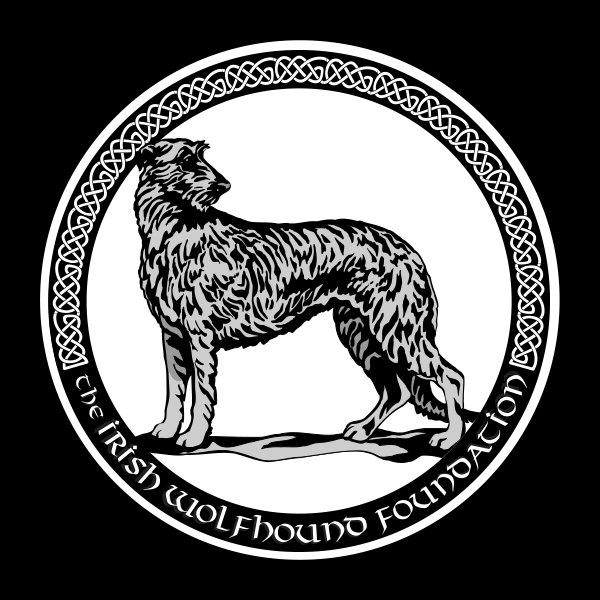IW Foundation Health Library
The Irish Wolfhound Foundation maintains a library of articles and links relevant to the health of the Irish Wolfhound. Some of these are specific to Irish Wolfhounds or other sighthounds, and some are applicable to any canine. Please feel free to print articles hosted on this website out for your own personal use, which can include taking them to your veterinarian. If you want to print a linked article you should contact the website hosting the article.
Health Library Topics
What are the biggest health concerns with the breed?
Related Topics
"Gentle When Stroked; Fierce When Provoked" as the old saying goes. A Wolfhound should be a gentle giant around the house and town, except when he feels you are being threatened. Positive reinforcement in training is the most effective way to teach an Irish Wolfhound anything.
Because of their rapid growth, IW puppies can experience joint problems while growing, particularly if they are overweight or putting undue pressure on a joint by doing things like jumping off a high surface.
Related Topics
Cancer is the number one cause of death in Irish Wolfhounds.
Related Topics
Clinical trials offer alternatives to established methods of treating and diagnosing conditions. They also lead to a better understanding of the conditions they investigate.
There are some sighthound-specific differences in the way some drugs are metabolized.
There are a few eye problems which can occur in IWs.
Genetics can be a fascinating subject.
Heart disease is one of the leading killers of IWs, but recent advances in cardiac screening and care are leading to longer lives.
Related Topics
The biggest liver-related concern in Irish Wolfhounds is Portosystemic Shunt, a.k.a. PSS or liver shunt.
A few links to information on Non-conventional and Complementary medicine.
A Wolfhound at full gallop is a thing of beauty.
Pneumonia is a life-threatening disease in Irish Wolfhounds.
You might be surprised by some of the things that are poisonous to dogs.
Breeding Irish Wolfhounds is not for the faint of heart.
Seizures are frightening in a dog the size of an Irish Wolfhound.
Probably the issue that first comes to mind when thinking of problems with the IW digestive system is bloat/torsion, also known as gastric dilatation and volvulus (GDV). This condition can be fatal and is always an emergency.
Another serious condition which is known to occur in Irish Wolfhounds is megaesophagus. While not an emergency, megaesophagus can cause great difficulties.
Breeding Irish Wolfhounds should be tested for hip dysplasia, elbow dysplasia, congenital heart problems and congenital eye problems. These tests can be performed after the age of 2. ALL adult Irish Wolfhounds should be screened for congenital heart problems, preferably annually. Heart disease is often treatable if caught early. Puppies should be tested for liver shunt before going to their new homes. Liver shunt, also known as portosystemic shunt or PSS, is a condition sometimes found in Irish Wolfhound puppies wherein the liver fails to screen toxins out of the blood. If untreated, the puppy will die. All IW puppies should be tested by their breeders for this condition before going to their new homes. The test is a simple blood test, performed after the puppy is about 8 weeks old. There really isn't just one right way to feed an Irish Wolfhound puppy. The goal is slow and steady growth. Growth plates do not close till around 18 months, so your IW is still a puppy for that long. Your breeder should be your first source of information on what to feed and when. If your breeder is not available, the only recommendation we can make is to NOT feed regular puppy kibble. It causes growth to be too rapid and can put too much weight on growing joints. Large breed puppy kibble is OK, as are various high quality all-life-stages kibbles. If you are interested in feeding raw, seek a mentor with experience raising puppies on a raw diet. It is very important to carefully balance nutrients for a growing IW puppy. It used to be the case that any dog not destined for breeding would be spayed/neutered at around 6 months. There have been studies, though, that correlate early spay/neuter with an increased risk of cancers (like bone cancer) in large dogs (e.g., Rottweilers and Golden Retrievers), as well as growth-related changes. Because of that, many breeders now recommend waiting until after the growth plates have closed (around 18 months) to perform that surgery. We have several articles in our health library discussing this topic and its pros and cons. Irish Wolfhounds are not typically prone to hormone-related behavior problems, but ultimately the decision to spay or neuter and when should be made after informed discussions with your breeder and veterinarian. Most likely it's what's known as a hygroma, a fluid-filled sac that cushions the joint. It can also appear on other joints, though the elbow is most common. The vast majority of these go away on their own with no treatment. Draining it not only risks infection, but the hygroma usually returns, anyway.Frequently Asked Questions


